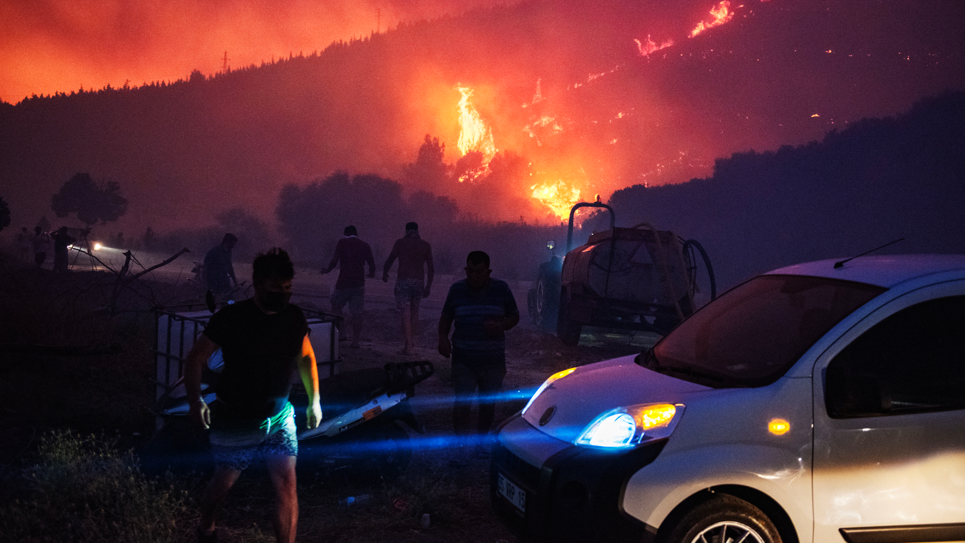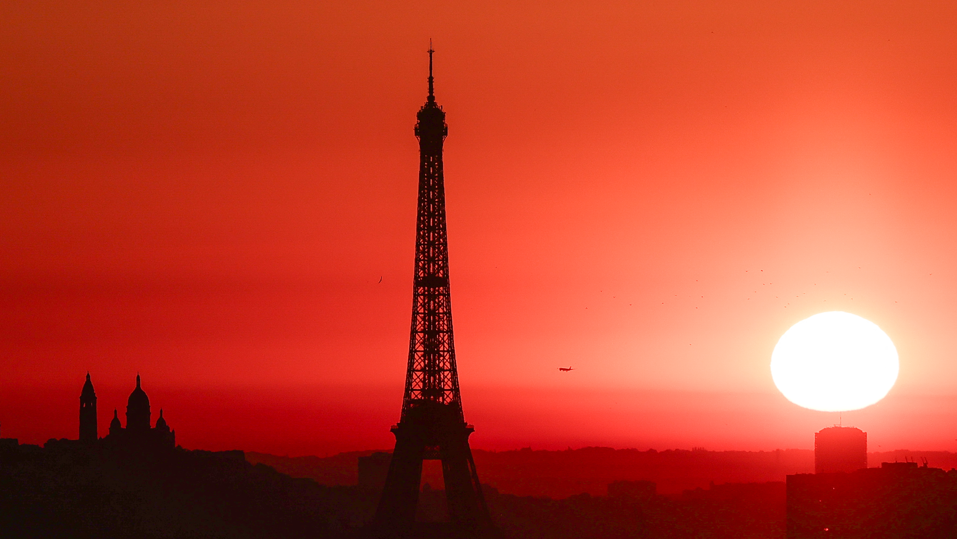Spain and England record hottest June as heatwave grips Europe

A woman fans herself during the June heatwave in Madrid
- Published
Spain and England have recorded their hottest June ever, as scorching temperatures continue to grip Europe.
Spain's weather service Aemet said the "extremely hot" June - with an average temperature of 23.6C (74.5F) - "has pulverised records", surpassing the normal average for July and August.
In England, the Met Office said June's mean temperature of 16.9C set a new record for that month, while the UK as a whole saw its second warmest June since records began in 1884.
Mainland Portugal experienced a record daily temperature for June of 46.6C. The monthly average data is yet to be released.
Wildfires in Turkey forced the evacuation of tens of thousands of people, while two people died in Italy following separate heat-related deaths.
Overnight, on the first day of July, Aemet said several places across the Iberian peninsula had topped 43C, but added a respite in temperatures was on its way from Thursday.
Night-time temperatures recorded overnight into Tuesday hit 28C in Seville and 27C in Barcelona.
Later on Tuesday, the UK recorded 34.7C in St James's Park in London, making it the hottest day of the year so far.
On Monday, the highest daily UK temperature was recorded at Heathrow Airport in London at 33.1C. Meanwhile, Wimbledon recorded a temperature of 32.9C, the tennis tournament's hottest opening day on record.
According to provisional data, the Met Office said the UK's mean temperature of 15.2C for June was the second highest on record for that month.
It was "only surpassed by June 2023, which recorded 15.8C", the agency said.
UK sees hottest day of the year: Live updates
In Turkey, rescuers earlier evacuated more than 50,000 people - mostly from the western province of Izmir - as firefighters continued to put out hundreds of wildfires that had broken out in recent days.
Fires have also swept through parts of Bilecik, Hatay, Sakarya, and Manisa provinces.
Forestry Minister Ibrahim Yumakli said over the past three days, emergency teams had responded to 263 wildfires nationwide.

Residents have been evacuated near the resort city of Izmir in Turkey as wildfires rage
In France, the heatwave continued across much of the country on Tuesday - a day after many cities experienced their hottest night and day on record for June.
At Paris Orly airport, a reading of 37.6C was recorded a short time ago.
The top of the Eiffel Tower in Paris has been closed because of the intense European heatwave; while Climate Minister Agnès Pannier-Runacher called it an "unprecedented" situation.
For first time in five years the Paris region has activated a red alert - the highest extreme heat warning - along with 15 other French regions.
As many as 1,896 schools and colleges in France were closed as of lunchtime on Tuesday because of the heat.
The establishments were all in departments in the country covered by the red alert.
A reading of 46.6 C (115.9F) was registered in Mora, Portugal, about 60 miles east of Lisbon on Sunday, the country's meteorological agency IPMA reported.
It was a record reading for mainland Portugal.

The summit of the Eiffel Tower will be closed all day on 1 July and 2 July, officials said
In Italy, the Tuscany region has seen hospital admissions rise by 20%, according to local reports.
Italians in 21 out of the 27 cities have been subjected to the highest heat alert and 13 regions, including Lombardy and Emilia, have been advised not to venture outside during the hottest periods of the day.
In Lombardy, working outdoors has been banned from 12:30 to 16:00 on hot days on building sites, roads and farms until September.
In Florence, central Italy, meteorologists registered a temperature of 38.9C on Tuesday, while the southern city of Cagliari was baking in 38.6C.
The temperatures are expected to get even higher later on Tuesday.
Temperatures in Greece have been approaching 40C for several days and wildfires hit several coastal towns near the capital Athens destroying homes and forcing people to evacuate.
In Germany, the country's meteorological service warned that temperatures could reach almost 38C on Tuesday and Wednesday - further potentially record-breaking temperatures.
The heatwave lowered levels in the Rhine River - a major shipping route - limiting the amount cargo ships can transport and raising freighting costs.
Countries in and around the Balkans have also been struggling with the intense heat, although temperatures have begun to cool. Wildfires have also been reported in Montenegro.
Heatwaves are seen as a serious health hazard, and they are also impacting the environment.
Higher temperatures in the Adriatic Sea are encouraging invasive species such as the poisonous lionfish, while also causing further stress on alpine glaciers that are already shrinking at record rates.
The UN's human rights chief, Volker Turk, warned on Monday that the heatwave highlighted the need for climate adaptation - moving away from practices and energy sources, such as fossil fuels, which are the main cause of climate change.
"Rising temperatures, rising seas, floods, droughts, and wildfires threaten our rights to life, to health, to a clean, healthy and sustainable environment, and much more," he told the UN's Human Rights Council.
Heatwaves are becoming more common due to human-caused climate change, according to the UN's Intergovernmental Panel on Climate Change.
Extreme hot weather will happen more often – and become even more intense - as the planet continues to warm, it has said.
Richard Allan, Professor of Climate Science at the University of Reading in the UK, explained that rising greenhouse gas levels are making it harder for the planet to lose excess heat.
"The warmer, thirstier atmosphere is more effective at drying soils, meaning heatwaves are intensifying, with moderate heat events now becoming extreme."
Correction on 1 July: An earlier version of this story stated that Portugal had recorded its hottest June. It has been amended to reflect that mainland Portugal experienced its highest daily June temperature on record.

Sign up for our Future Earth newsletter to keep up with the latest climate and environment stories with the BBC's Justin Rowlatt. Outside the UK? Sign up to our international newsletter here.